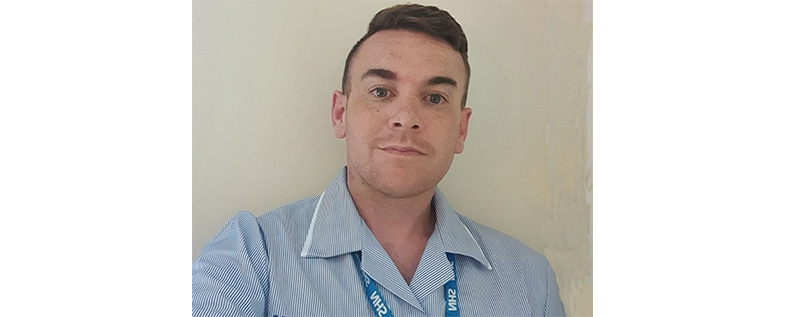Using person centred nursing care to improve patients’ lives – Part 2 of 2

In this second blog in a two-part series, we explore what person centred nursing care means.
Firstly, welcome to my blog on person centred nursing care. My name is Dominic Kenyon and I’m currently a Registered Nursing Associate undertaking a further degree to become a Registered Learning Disability Nurse.
I began working for the Lancashire and South Cumbria NHS Foundation Trust (LSCft) around six years ago, initially as a Healthcare Support Worker. Before joining the trust, I had already gained experience working with children and adults with mental-ill health and various levels of learning disabilities.
What does person centred nursing care look like?
Person centred nursing is an approach that puts people at the heart of their care; patients/service users are recognised as individuals, with their needs and preferences understood and respected. Essentially, the nurse needs to thoroughly learn about the person and how their experiences, health condition/s and any other factors may impact on the care they require.
The best example of person centred care I can recall is with a gentleman with Alzheimer’s, who I supported whilst working for a respite care charity. The first day I met him, I realised that he had slowly lost the ability to look after himself and do the activities that made him happy. We created a fantastic working relationship based on giving him back his independence. We broke down daily tasks such as dressing and cooking into manageable chunks to ensure he could carry them out on his own; this helped maintain the skills he had and empowered him.
This gentleman enjoyed fitness and being in places surrounded by nature. Unfortunately, due to a deterioration in his condition, he had stopped running and going to the gym, as he often forgot the process he had started. This had a devastating impact on his wellbeing, leaving him feeling frustrated. I started taking him for runs (a passion we both shared) and created a routine in the gym. We even went birdwatching together to give him back his connection with nature.
Personally, my main focus in care has always been to improve somebody’s life, whether as a support worker in the healthcare sector or as a nursing associate working for the NHS. I have always invested my time in training, learning, and improving the work I do. The Trainee Nursing Associate course allowed me to advance my learning from a diploma to a foundation degree, providing far greater insight into physical and mental healthcare that I can now apply to my nursing practice.
I want to use the skills I’ve gained from my practical experience and studying for a degree to improve access to care for people with learning disabilities. Mainstream healthcare settings are often difficult environments for people with learning disabilities. I supported an individual with autism and a learning disability whilst she was in a mental health ward. The busy ward, with its limited interaction, combined with her communication barriers, meant that her anxiety levels were raised to a level where she was having increased suicidal thoughts. While on the ward she attempted to harm herself and others and was therefore identified as having “behaviour that challenged”. This behaviour was really created by an environment that couldn’t provide the adaptations she needed to communicate her needs.
My experiences have taught me that by taking the time to understand an individual’s needs, we can improve the outcomes for them and make the work of healthcare staff more fulfilling. Many learning-disabled individuals would be better served being cared for in the community, where they are in familiar surroundings and feel comfortable. At LSCft, we have an intensive support team that works with learning-disabled people to give them additional support in the community.
In summary, I feel that person centred care goes hand in hand with good communication and the ability to fully understand the person you are offering support to. As professionals, we must learn to listen on a deep level and be willing to understand the journey a person may have been on. Through understanding, listening, and adapting our approach, we can build a therapeutic working relationship.

